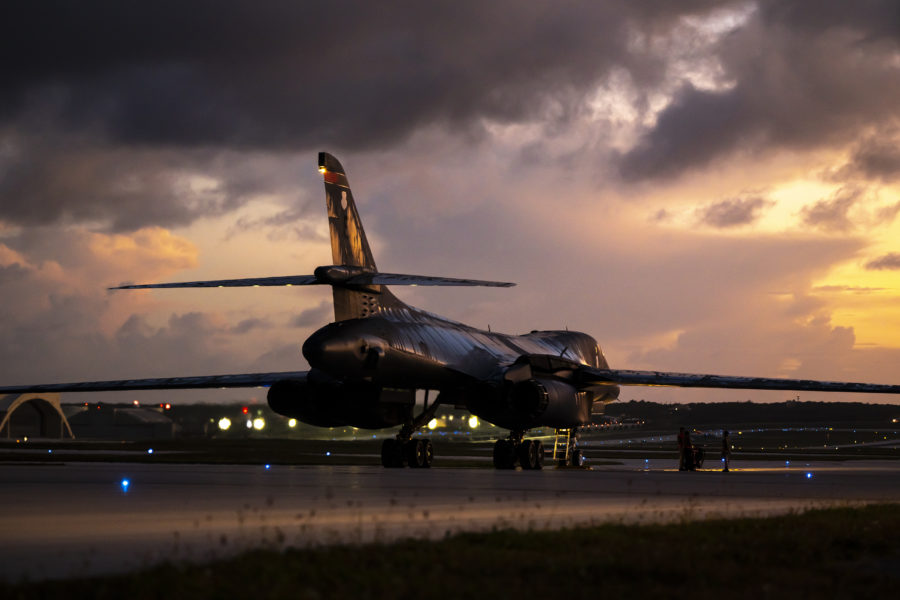ANDERSEN AIR FORCE BASE, Guam—U.S. and Japanese pilots exchanged silent high fives from their respective cockpits during the 34th Expeditionary Bomb Squadron’s bomber task force mission to Guam.
“When we’re talking to any ally or partner out there, the procedures are standard—everything’s the same,” said Air Force Lt. Col. Jeffrey Carter, a B-1 pilot deployed to Andersen Air Force Base, Guam, from the 34th EBS at Ellsworth Air Force Base, S.D.
“It doesn’t feel like I’m working with one person or one country versus another. It’s just, we’re all up there,” Carter said on the flight line at Andersen next to one of the four B-1s that deployed recently and have been exercising with the Japan Air Self-Defense Force. Other partners and allies are to follow in the coming weeks.
“When we see each other through the cockpit windows, and we’re just doing our high-fives and fist bumps in the air, it seems like you’re just flying with someone else in your squadron,” he added. “And that’s kind of, I think, the biggest improvement with all this integration.”
In April 2020, the Air Force announced that it would stop its continuous bomber presence outside the continental United States, ending a 16-year run at Andersen. Since then, however, B-1s—with their three weapons bays and supersonic speeds—have made regular return visits on rotating bomber task force missions ranging from one to three months.
Practicing Pacific Skills
On a recent afternoon, two of the weapons bays on a B-1 were equipped with fuel tanks carrying 20,000 pounds each, capable of extending the flight time of the bomber over the vast distances of the Pacific.

Even with the capacity to fly longer distances without refueling, crews typically refuel from a tanker multiple times on the 17-hour flight from Ellsworth to give younger Airmen the opportunity to practice aerial refueling.
Since the 34th EBS arrived, Airmen have also practiced addressing the unique challenges posed by the Pacific theater.
“Each region has its own nuances, where it just takes a different set of skills or processes to get to the right answer more efficiently,” said Carter, noting the different airspace, constructs, and international rules to follow. Other crew members noted how sudden rain showers during the coming typhoon season in Guam can double the stopping distance on the runway.
Carter explained how flying over the Pacific Ocean is not as disconnected from headquarters as it once was.
“Crossing these vast distances doesn’t seem as large or daunting anymore because of the amount of control, the amount of touch points you have,” he said, acknowledging the benefit of satellite communication. “So, you’re not really alone, and not afraid anymore.”
Allies Unite to Deter China
As China continues to rapidly grow its military capacity with a powerful defense manufacturing sector, the U.S.’s Pacific allies are increasingly integrating to keep up. That is especially true for a capability only provided by the U.S. Air Force: manned bombers.
“Countries are interested in doing some bomber missions with us,” Pacific Air Forces commander Gen. Kenneth S. Wilsbach said during an interview at PACAF headquarters at Joint Base Pearl Harbor-Hickam, Hawaii.
“We do a lot of bomber missions with the Japanese,” he said. “We’ve done some bomber missions with other countries in the region, and we’re trying to expand that as we go forward.”

Zack Cooper, research fellow at the American Enterprise Institute, said in an interview that Guam’s standoff location from China, in the second island chain, makes it an ideal location to host bombers.
“Bombers and fighters need very different runways—they need different support systems,” said Cooper. “As far as the bomber force goes, it means probably more focus for the Air Force on larger facilities that are a little bit further away, so places like Guam make a fair amount of sense.”
Anderson has four total runways. Its two main runways are 10,500 feet and 11,200 feet in length, while the newer northwestern runways, used for practicing austere exercises, are 4,200 feet and 9,000 feet. The B-1 requires about 8,000 feet to land.
Retired Lt. Gen. David A. Deptula, dean of AFA’s Mitchell Institute for Aerospace Studies, helped to establish the continuous bomber presence on Guam in 2004, but he now believes the bomber task force (BTF) concept is proving efficient for the Air Force.
“It was expensive,” he said of maintaining a continuous bomber presence so far from the mainland.
“They figured with these bomber task forces, they can fly in a more random nature,” Deptula added. “It’s also one of the strengths that you can home-base your bombers in the continental United States, but you can forward-deploy them, if necessary, pretty rapidly.”
Wilsbach said that while Guam is the typical site for BTF missions, they can be done from other locations in the Pacific, such as Australia.
“We’ll have some other places that we can do bomber task force missions,” he said. “The bomber missions have been going pretty well in the Pacific.”
Capt. Jack Maliska, also deployed with the 34th EBS, said the Air Force’s concept of agile combat employment, or operating from austere locations, and the BTF concept both serve as a foundation for working with partners and allies.
“Flexibility is always the key to air power,” Maliska said. “Going forward, we’re helping build that foundation. It’s only going to help build that rapport. “
